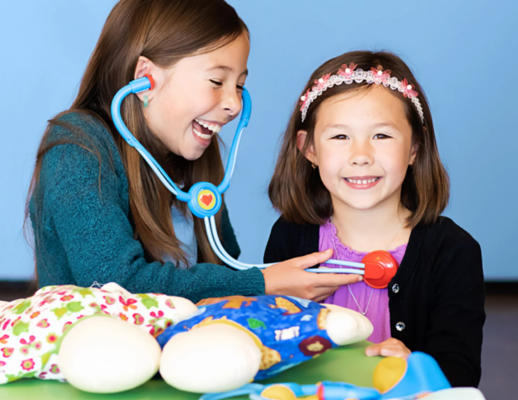UCSF Benioff Children’s Hospital Oakland has long been a leader in building trusting, respectful relationships with patients and their families, most of whom are dealing with trauma. “Our patients are mostly families of color and about 80 percent live at or below the poverty level.” says CHO pediatrician Dayna Long. “I know from working at this clinic, it’s not just the ear infections or asthma I’m treating — it’s what’s happening to the child physiologically and (connected) to the environment and unmet social needs.”
In this video, we follow Dr. Long and other providers as they talk with, screen and treat families at the hospital’s Claremont Clinic campus. In 2018 the clinic joined the first cohort of Resilient Beginnings, a San Francisco Bay Area learning collaborative launched by the Center for Care Innovations to advance trauma and resilience-informed care in pediatrics. Dr. Long credits the collaborative with helping her, her team and her partners at UCSF and elsewhere develop a key trauma screening and response tool. “There are a lot of really hard things that are happening to our families to cause stress,” she says, “and that stress has biologic embedding that influences higher rates of diabetes, obesity, asthma, learning and behavioral issues,” as well as other disease in later life. To help break this cycle, the team decided to create a prospective standardized screen to identify children early who are at risk for toxic stress — and take steps to prevent it.
To do so, Dr. Long and her partners at Children’s Hospital Oakland, UCSF and the Center for Youth Wellness looked at the original CDC-Kaiser questionnaire for adverse childhood experiences (ACEs) and added questions about social drivers — “upstream factors that we truly believed were impacting health outcomes: domestic violence, community violence, food insecurity, and housing instability.,” she says. The result? The PEARLs screening tool, which stands for Pediatric Early Adversity and Related Life Events. In 2019, it was adopted as California’s official screener in its initiative to combat ACEs, which are linked to toxic stress and a higher risk of chronic disease and mental ills throughout the lifespan.
Meanwhile, the clinic has trained everyone how to use PEARLS in ACEs screening, from receptionists and medical assistants to physicians and licensed vocational nurses. “I think when we first looked at it, we said, ‘What are we going to do with this information?'” says Kelley Meade, MD. Over time, she says, “we realized that actually screening starts the conversation and opens more dialogue, and most families are actually really receptive to it.”
Long agrees. “Health doesn’t just happen within the walls of a clinic: Health happens out in communities,” she says. “And our children, they are experiencing traumas, and if we don’t ask about it, how are we going to help them heal? We have screened over 1.3 million children just within the state of California alone. I think that we have already transformed the entire field of pediatrics.”
Find this useful or interesting? We’re constantly sharing stuff like this. Sign up to receive our newsletter to stay in the loop.

